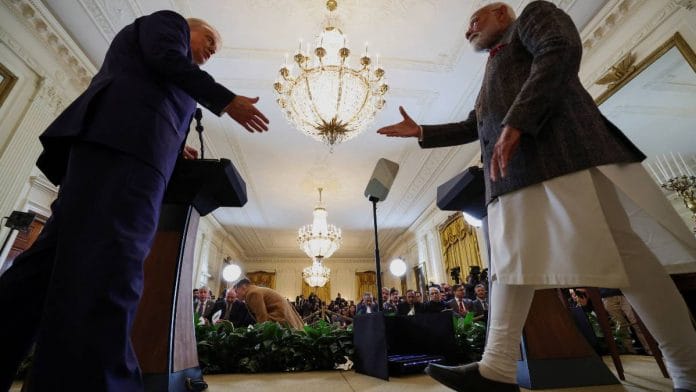New Delhi: The meeting between Prime Minister Narendra Modi and US President Donald Trump at the White House earlier this month saw both leaders guaranteeing each other cooperation in specific areas of interest if the other took care of their concerns, ThePrint has learnt.
Government sources told ThePrint that the Trump administration has agreed to work with India on a number of national security concerns, especially the issue of Sikh separatism and global terrorism.
Trump also promised to deepen collaboration in sectors such as defence and critical technologies during Modi’s visit to Washington DC.
People familiar with the matter said the visit, while early in Trump’s term, has set the tone of the India-US relationship, including promise of decisive action against those “who threaten public and diplomatic safety and security, and the sovereignty and territorial integrity” of both countries.
The agreement on cooperation on security challenges finds mention in the joint statement announced by both leaders on 13 February.
It makes clear mention of “decisive action” against those who threaten India’s sovereignty and territorial integrity—indicating the recent spate of activities by Sikh separatists in the US.
Sikh separatism has grown across North America and the United Kingdom, with a number of individuals linked to groups promoting the secession of Indian territory, attacking Indian diplomats and diplomatic missions. In 2023, Sikh separatists attempted to set the Indian consulate in San Francisco on fire and vandalised the premises.
At the time, the US administration under then President Joe Biden condemned the incident as a “criminal offence”. However, Biden administration officials also reportedly met with groups linked to separatist activities last September, a day before the former US President was set to host Modi in his hometown in Delaware.
A person familiar with this month’s Modi-Trump talks said it was a meeting of minds between the two leaders, and allowed them to build on the rapport they shared during Trump’s first term as US president. The key outcomes should be understood as a promise of continuity, with new strategic heft across the India-US relationship, he said.
Also Read: Where is Modi and Trump’s ‘bromance’ headed & an ‘unusual’ caste hierarchy on India’s roads
Key takeaways
When asked what Trump sought from India, the government sources said the visit allowed New Delhi and Washington to discuss certain challenging issues in ties, namely illegal migration and tariffs.
They said that Trump raised his major issues with the relationship with India—illegal migration and tariffs. The US President has in the past called New Delhi as “tariff king” and has continued pushing India to reduce tariffs since the beginning of his second term this January.
The meeting allowed the two leaders to find common ground on the issue of tariffs, with a potential bilateral trade agreement in the works.
New Delhi has been able to find the space to navigate Trump’s major issues by being open to such an agreement, with the “first tranche” of the deal expected to be announced by fall of this year.
This has not stopped Trump from raising the tariff issue publicly, but Modi’s visit has at least allowed both New Delhi and Washington to seriously explore the trade agreement, giving the two administrations a timeframe for the final deal.
The Modi-Trump bilateral meet saw India’s position on trade clearly stated and further areas where the two countries can cooperate, and this allowed the other parts of the ties to proceed further, the person familiar with the matter explained.
Before Modi’s visit to the US, India accepted Trump’s repatriation plans, including the usage of military plans for the deportation of Indians. New Delhi also announced amendments to the civil nuclear liability law, before the visit, which has been perceived as a stumbling block for international civil nuclear cooperation, especially for American companies looking to set up in India.
Post the visit, the two countries announced the purchase of an additional P-8I maritime patrol aircrafts, subject to agreement of sales terms. Trump has publicly called on India to procure more American security platforms as a way to reduce the trade deficit.
India exported roughly $77 billion worth of goods to the US in 2023-2024 and imported around $42.1 billion worth of goods. For the new US President, deficits have been a major issue.
On illegal migration, India has been clear that it is willing to cooperate with the US for the repatriation of verified Indians who have been attempting to enter or live in the country illegally. The US has since sent at least three military planes filled with Indians, which have landed in Amritsar.
India has seen the matter as a security issue, given its consistent claim that illegal migration is supported by a vast network of organised crime gangs. This has allowed New Delhi space to navigate one of the most important policies on Trump’s agenda without facing economic threats, like Colombia.
Moreover, there have been no changes, yet, to the H-1B visa policy, which has seen Indians being one of the largest beneficiaries of legal migration to the US. Over 70 percent of all H-1B visas in 2023 were issued to Indians.
For New Delhi, continuation of the policy is an important consideration, and both leaders agreed to streamline the legal mobility processes, which is considered as another key takeaway from Modi’s visit to the US.
(Edited by Nida Fatima Siddiqui)
Also Read: As 2 ‘friends’ meet, how Modi will walk Trump’s tightrope & still get what India wants







Excellent news indeed! Every single Khalistani terrorist in USA must be extradited to India.
So that’s the reason Gurpatwant Singh Pannun has gone silent ever since the US election results were declared. I have been wondering for long where has this guy gone – now it seems like he is afraid that the US agencies will come looking for him.
Maybe he will seek shelter in Canada as he holds dual citizenship.